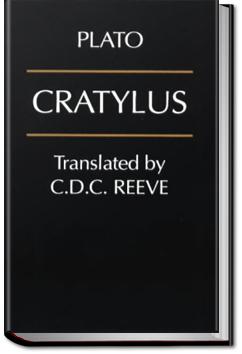UNLIMITED Audiobooks and eBooks
Over 40,000 books & works on all major devices
Get ALL YOU CAN for FREE for 30 days!
Cratylus
Plato
Book Overview:
Cratylus discusses whether things have names by mere convention or have true names which can only be correctly applied to the object named and may have originated from God.
Cratylus discusses whether things have names by mere convention or have true names which can only be correctly applied to the object named and may have originated from God.
How does All You Can Books work?
All You Can Books gives you UNLIMITED access to over 40,000 Audiobooks, eBooks, and Foreign Language courses. Download as many audiobooks, ebooks, language audio courses, and language e-workbooks as you want during the FREE trial and it's all yours to keep even if you cancel during the FREE trial. The service works on any major device including computers, smartphones, music players, e-readers, and tablets. You can try the service for FREE for 30 days then it's just $19.99 per month after that. So for the price everyone else charges for just 1 book, we offer you UNLIMITED audio books, e-books and language courses to download and enjoy as you please. No restrictions.
Try now for FREE!

"Love your service - thanks so much for what you do!"
- Customer Cathryn Mazer
"I did not realize that you would have so many audio books I would enjoy"
- Customer Sharon Morrison
"For all my fellow Audio Book & E-Book regulars:
This is about as close to nirvana as I have found!"
- Twitter post from @bobbyekat



Community Reviews
Cratylus takes the position of Heraclitus, that all things are in motion and flux. Words then become conventional signs, as it were, that point to something else. There is a measure of prior knowledge that is required for the sign to mean anything substantial and there is a measure of relativity inv
Nezaobilazno delo za razumevanje odnosa između reči i stvari.
U ovom Platonovom dijalogu, sukobljene su dve strane – konvencionalistička i naturalistička. Prvu zastupa Hermogen, koji brani tvrdnju da reči proističu iz dogovora između ljudi, da su reči konvencija, dok drugi pogled, koji zastupa Krati
Κάθε έργο του Πλάτωνα που έρχομαι σε επαφή είναι μία αποκάλυψη! Πόσο ωραία πλέκει τη γνώση, με τέτοιο τρόπο [βήμα-βήμα] που το κάθε θέμα φαίνεται τόσο απλό αλλά και τόσο εντυπωσιακό.
Στον διάλογο αυτό, εξετάζει την προέλευση των ονομάτων. Δίνει σημασία στον ήχο των γραμμάτων και τη σύνθεση των λέξεων
Aunque es un texto corto, por momentos se vuelve bastante complejo de seguir para quienes, como yo, no tienen ninguna formación en griego antiguo. Las reflexiones sobre el rol de la etimología en la comprensión de la realidad de las cosas y las limitaciones del conocimiento a través del lenguaje me
The topic of Cratylus is the correctness of names – and hence the criteria that should determine the correct choice of name. On one side, Cratylus argues that there is a “correctness of name for each thing, one that belongs to it by nature”; on the other, Hermogenes stance is that the correctness of
Cratylus is one of Plato’s early-middle dialogues. It is somewhat puzzling for the modern reader, since much of the dialogue is taken up with fanciful folk etymologies of Greek words. Socrates is investigating whether the names of the Gods, heroes, citizens, or natural elements are meaningful, and i
On the importance of names and use of the right words and names
[Outside the Potts residence. JEREMY, JEMIMA, SOCRATES]
SOCRATES: Good day, young friends. May I inquire whether your father is at home?
JEMIMA: I’m sorry, Daddy is out.
JEREMY: He’s trying to sell an invention.
JEMIMA: Can we help you, Mr…?
SOCRATES: Socrates. My unworthy name is Socrates.
JEREMY: The S